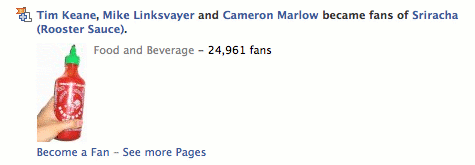And so it goes for ALL-ETT, the ultimate wallet. Bem+Wom: BEtter Mousetrap + Word Of Mouth. It actually works.
It works for Google too:
[Google’s] growth has come not through TV ad campaigns, but through word of mouth from one satisfied user to another
And now, a viral restaurant.
But, beyond anecdote, continuing from the previous post, is this sort of thing worth $15 billion?
Companies with Bem benefit hugely from Wom and will happily pay for it.
And social networks are nothing if not mouths exchanging words, so it’s natural to think of some paid version of Bem+Wom as their killer app. Facebook Beacon is an innovative attempt despite the overblown backlash.
Paying mouths for words is affiliate marketing, a respectable if not Google-sized business. But turning friends (or celebrities) into salespeople induces a threshold of skepticism, as it should. Paid mouths’ faces must be awfully trustworthy, their words especially persuasive to be believed. Is it even “word of mouth” anymore?
Can Bem+Wom be monetized without mucking it up?

